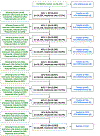Evolving Science on Cardiovascular Disease Among Hispanic/Latino Adults: JACC International
- PMID: 37045521
- PMCID: PMC12330305
- DOI: 10.1016/j.jacc.2023.02.023
Evolving Science on Cardiovascular Disease Among Hispanic/Latino Adults: JACC International
Abstract
The landmark, multicenter HCHS/SOL (Hispanic Community Health Study/Study of Latinos) is the largest, most comprehensive, longitudinal community-based cohort study to date of diverse Hispanic/Latino persons in the United States. The HCHS/SOL aimed to address the dearth of comprehensive data on risk factors for cardiovascular disease (CVD) and other chronic diseases in this population and has expanded considerably in scope since its inception. This paper describes the aims/objectives and data collection of the HCHS/SOL and its ancillary studies to date and highlights the critical and sizable contributions made by the study to understanding the prevalence of and changes in CVD risk/protective factors and the burden of CVD and related chronic conditions among adults of diverse Hispanic/Latino backgrounds. The continued follow-up of this cohort will allow in-depth investigations on cardiovascular and pulmonary outcomes in this population, and data from the ongoing ancillary studies will facilitate generation of new hypotheses and study questions.
Keywords: Hispanic/Latino; cardiovascular disease; cohort study; study design.
Copyright © 2023 American College of Cardiology Foundation. All rights reserved.
Conflict of interest statement
Funding Support and Author Disclosures The HCHS/SOL is a collaborative study supported by contracts from the National Heart, Lung, and Blood Institute to the University of North Carolina (HHSN268201300001I/N01-HC-65233), University of Miami (HHSN268201300004I/N01-HC-65234), Albert Einstein College of Medicine (HHSN268201300002I/N01-HC-65235), University of Illinois Chicago (HHSN268201300003I/N01-HC-65236, Northwestern University), and San Diego State University (HHSN268201300005I/N01-HC-65237). The following institutes/centers/offices have contributed to the HCHS/SOL through a transfer of funds to the National Heart, Lung, and Blood Institute: National Institute on Minority Health and Health Disparities, National Institute on Deafness and Other Communication Disorders, National Institute of Dental and Craniofacial Research, National Institute of Diabetes and Digestive and Kidney Diseases, National Institute of Neurological Disorders and Stroke, National Institutes of Health Institution-Office of Dietary Supplements, and UC San Diego, National Institute on Aging: R01AG075758, R56 2-AG048642, RF1AG054548, RF1AG061022, RF1NS127266, R01AG061088, RF1AG077639. The funding agency had a role in the design and conduct of the HCHS/SOL; in the collection, analysis, and interpretation of HCHS/SOL data; and in the review and approval of this manuscript. The views expressed in this manuscript are those of the authors and do not necessarily represent the views of the National Heart, Lung, and Blood Institute; the National Institutes of Health; or the U.S. Department of Health and Human Services. The authors have reported that they have no relationships relevant to the contents of this paper to disclose.
Figures




Comment in
-
Cardiovascular Health in Hispanic/Latino Patients: From Research to Practice.J Am Coll Cardiol. 2023 Apr 18;81(15):1521-1523. doi: 10.1016/j.jacc.2023.02.025. J Am Coll Cardiol. 2023. PMID: 37045522 Free PMC article. No abstract available.
References
-
- Nicholas Jones RM, Ramirez Roberto, Rio-Vargas Merarys. 2020. Census Illuminates Racial and Ethnic Composition of the Country. Available at: https://www.census.gov/library/stories/2021/08/improved-race-ethnicity-m.... Accessed 08/20/2022.
-
- NHLBI Working Group on Epidemiologic Research in Hispanic Populations Opportunities, Barriers and Solutions (Chairs: Ramirez A, Stern M). July 31-August 1, 2003, Bethesda, MD. 2003.
Publication types
MeSH terms
Grants and funding
- HHSN268201000031C/HL/NHLBI NIH HHS/United States
- HHSN268201300005C/HL/NHLBI NIH HHS/United States
- HHSN268201300004C/HL/NHLBI NIH HHS/United States
- N01 HC065233/HL/NHLBI NIH HHS/United States
- N01 HC065236/HL/NHLBI NIH HHS/United States
- N01 HC065235/HL/NHLBI NIH HHS/United States
- N01 HC065234/HL/NHLBI NIH HHS/United States
- RF1 AG077639/AG/NIA NIH HHS/United States
- R01 AG061088/AG/NIA NIH HHS/United States
- RF1 NS127266/NS/NINDS NIH HHS/United States
- HHSN261201300005I/CA/NCI NIH HHS/United States
- N01 HC065237/HL/NHLBI NIH HHS/United States
- HHSN268201000001I/HL/NHLBI NIH HHS/United States
- HHSN268201300003I/HL/NHLBI NIH HHS/United States
- RF1 AG061022/AG/NIA NIH HHS/United States
- R56 AG048642/AG/NIA NIH HHS/United States
- RF1 AG054548/AG/NIA NIH HHS/United States
- HHSN261201300004I/CA/NCI NIH HHS/United States
- HHSN268201300001C/HB/NHLBI NIH HHS/United States
- HHSN268201000021C/HL/NHLBI NIH HHS/United States
- HHSN268201300003C/HG/NHGRI NIH HHS/United States
- R01 AG075758/AG/NIA NIH HHS/United States
LinkOut - more resources
Full Text Sources
Molecular Biology Databases

